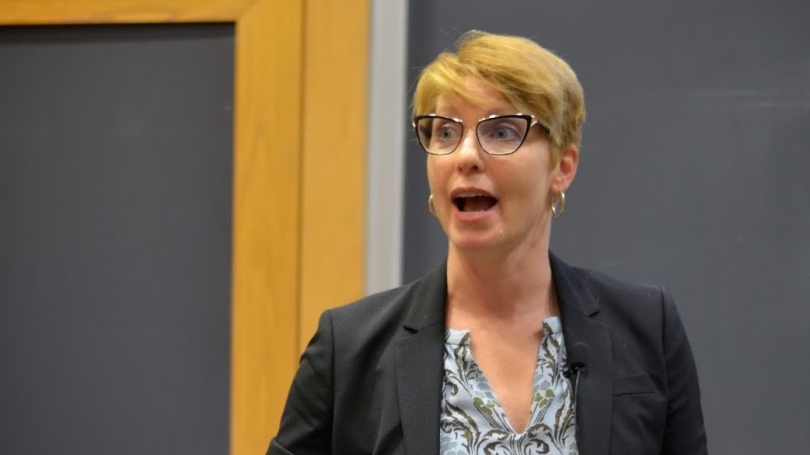For this year’s Constitution Day, the Rockefeller Center featured Jennifer Sargent, a Visiting Associate Professor of Writing at Dartmouth College. In her lecture, Professor Sargent discussed the scope of the Fourth Amendment’s privacy law as it applies to digital technology and information.
In addition to being a part of the Dartmouth faculty, Professor Sargent is also a faculty member at the National Judicial College in Reno, Nevada. Professor Sargent served as a District Court Judge in New Hampshire for eight years before she resigned from the bench to serve as Chief Disciplinary Counsel for the New Hampshire Supreme Court Attorney Discipline Office.
Before her talk, “Hey, You Can’t Just Look in There: Current Fourth Amendment Issues Regarding Cell Phone and Email Privacy after Riley v. California (2014)”, Courtney Wong ’15 sat down with Professor Sargent for an interview.
Courtney Wong '15 (CW): You’ve done a lot of different things in the law field, one of which was teaching at the Vermont Law School and at Dartmouth while you were on the bench. What was that experience like?
Professor Jennifer Sargent (JS): It was great! The two would sometimes inform each other, and they never presented a conflict. My teaching certainly helped me be a better judge. I was constantly reminded of judicial doctrine, tests, and ways to apply the law.
In fact, I think that the teaching informed being a judge more than being a judge informed the teaching, except for the war stories. You really can’t make some of this stuff up! I would bring those factual scenarios in the form of changed hypotheticals to the classroom in order to ask practical questions about how certain things might really operate.
CW: You resigned from the bench by choice. Do you ever miss it?
JS: I don’t miss it, but that doesn’t mean I didn’t like it. I am fulfilled in a lot of different ways. Being a decision maker is fulfilling, which I still get to do, but frankly having the weight of someone else’s well being on me is a pressure that I can happily live without, although I happily exercised it when I was imbued with the responsibility to make those decisions. But it was stressful.
Looking back on when I was being sworn in in the governor’s legislative chambers, I realized that I was chosen to be the decision maker for all the other people in society. There isn’t anything organically that makes me a better decision maker, but I’ve learned from my legal studies and my human experience to analyze intellectually and use good common sense, so at that point I felt very responsible for the weight of the community. The people trusted me to take legal doctrine to make important decisions that would affect society.
CW: In one of your pieces that you had written for the Dartmouth publication MOUTH, you mentioned that you had your son around the same time you were a public defender…how did you achieve that work-life balance?
JS: I have never achieved work-life balance. I think it’s a dangerous myth. There’s a way to incorporate your work life with your home life, but I don’t think they’re ever balanced – you’re always putting one as the priority over another and you have to know when each comes first. Theoretically, family always does come first, but there are just some days when you have a duty to a client. And if you’re going to take that duty seriously, you have to be available.
I guess I’m also lucky because I loved my job. So even though I was going into the office during my maternity leave, I liked it and felt like I could both take care of my son and be available to work.
CW: A lot of students know you on campus as one of the best Zumba instructors. How did you get involved with teaching Zumba?
JS: Well I love Zumba and we didn’t have anyone teaching it on campus at the time. I got certified to teach it with the intention of teaching it at Dartmouth because I thought to myself, “Dartmouth needs some Zumba.” It’s great to see that Zumba is now sweeping the Dartmouth nation.
What is Constitution Day?
Constitution Day is an American federal observance that recognizes the adoption of the United States Constitution and those who have become U.S. citizens. It is normally observed on September 17, the day in 1787 that delegates to the Constitutional Convention signed the document in Philadelphia, PA.
